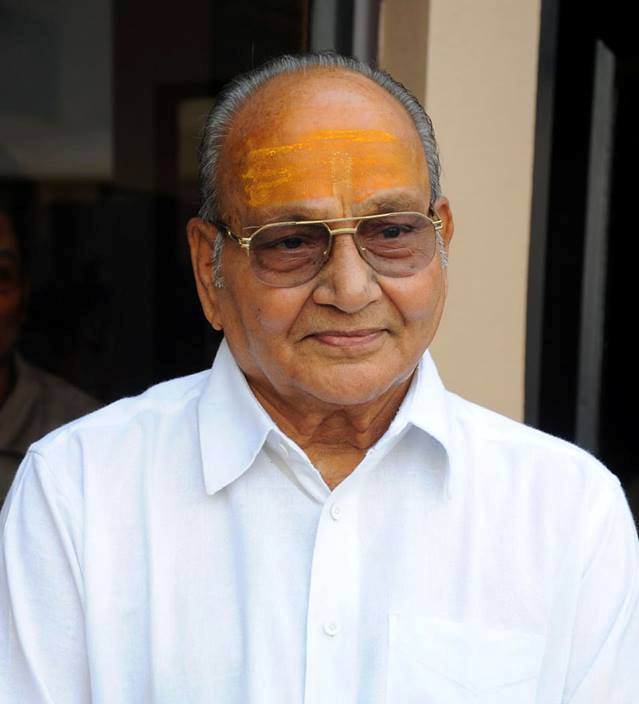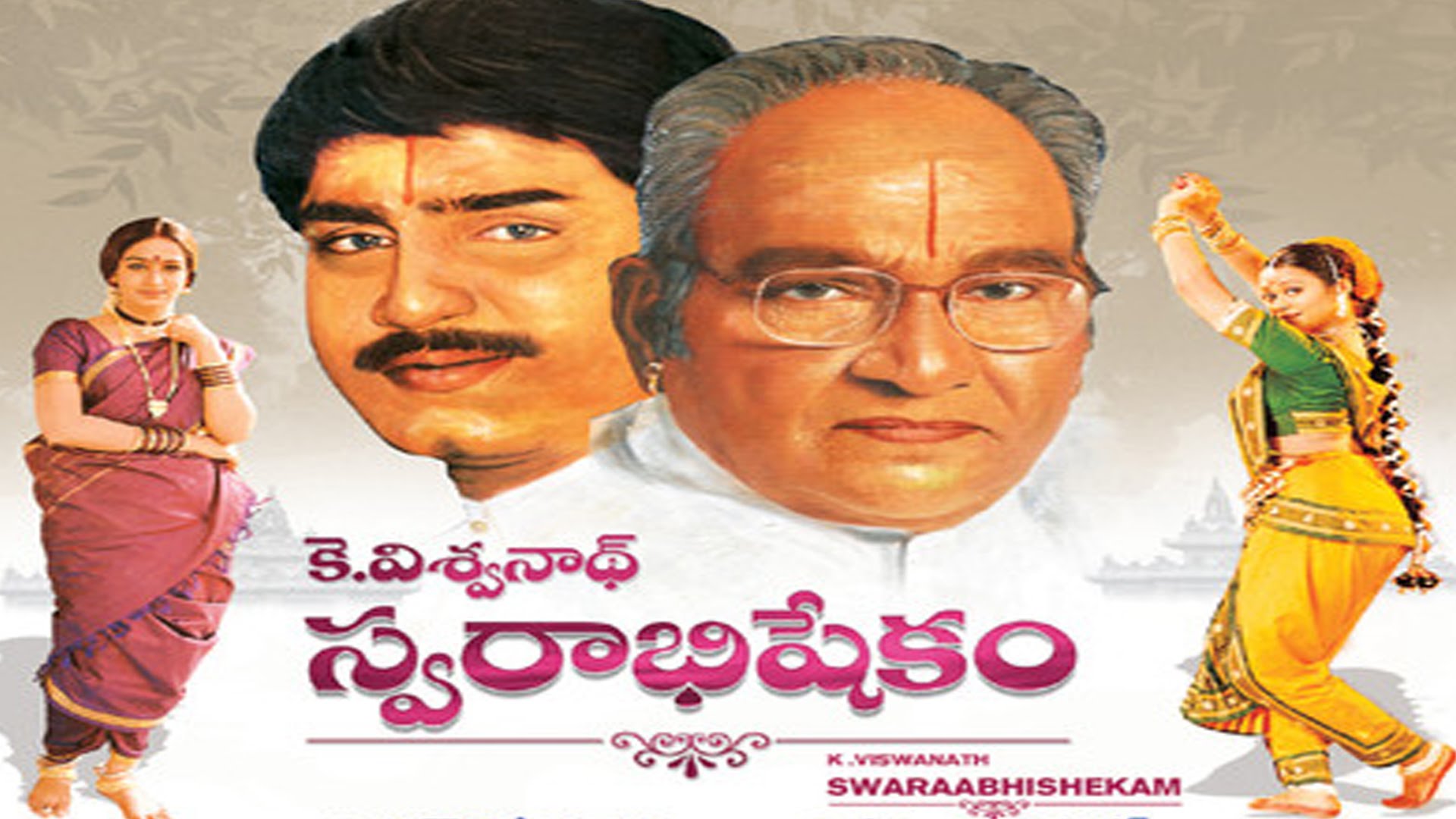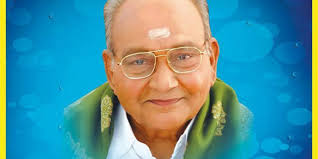In honour of the recent announcement for the Dadasaheb Phalke Award, our Post today is on its 2016 recipient.
While it is true that we Telugus often feel short-shrifted on the national award front, it’s also important to recognise when the central committees actually get it right. Continuing our ongoing Series on Andhra Personalities is that stalwart of Telugu Cinema, Sri K.Viswanath.
Background
Born in 1930, Kasinathuni Viswanath hails from Peddapulivarru, in Guntur District, Andhra Pradesh. His parents were Subramanyam and Saraswathamma. His father was a manager in Vahini pictures at Vijayawada (where he would study). Viswanath would later graduate from Andhra Christian College, Guntur and then follow in the family footsteps in film.
What is often not known, is that long before he was a director and writer, he was a technician. In fact, he got his start in the Sound Department on the set of his first movie: Thodi Kodallu. Nevertheless, it was a humble start to what would go on to be a prolific career, as even a short glance at his filmography would show. With 36 films to his name as director (and around 50 in other roles), his movies represent real cultured cinema.
There are no vulgar, double entendre dialogues in his films, which are pleasant, steeped in the local ethos, and with music, dance and traditional art forms. [5]
In a poetic twist, he is said to have been noted for his talent by none other than Nageswara Rao gaaru, and the rest was history. K.Viswanath made his directorial debut in 1965’s Atma-Gouravam, featuring ANR. While he established himself in the 60s and 70s (especially with Siri Siri Muvva), it was in the subsequent decades that the screen-poet of Peddapulivarru made his maximum impact. Starting from 1980’s Sankarabharanam to 1983’s Sagara Sangamam to 1986’s Swati Muthyam to 1987’s Swayam Krushi, this was the decade in which he seemingly dominated.
In the 1990s, he would also make appearance as a mainstream actor, rounding out his cinematic abilities. Subha Sankalpam featured his acting debut, reputedly at the behest of none other than Kamal Haasan, who said the role needed a venerable person before whom he could bow.
Maximum cast in his movies were Jayaprada, Chiranjeevi, and Kamal Haasan. Other actors were Bhanupriya, Venkatesh, Radhika, Vijayasanthi, and Srikanth.
He was also fluent in Tamil and did a number of movies in that language, such as Salangai Oil and Sippikul Muthu. He also made a few Hindi movies such as Eeswar and Kaamchor, although they did not rise to the same level he achieved in Telugu.
At a time when Indic and especially Telugu language and culture is on the defensive, K.Viswanath represents the importance of steeping mass culture in classical culture. After an era plagued by back-bencher blockbusters and item-dance driven nuisance flicks, the cultural quagmire of modern India requires guiding lights to return it to the glory of Maya Bazaar and Missamma. Viswanath garu demonstrates one such deepam.
A presenter of classical and traditional art, music and dance, K Viswanath has been a guiding force in the Indian film industry. As a director he has made fifty films since 1965 known for their strong content, endearing narrative, honest handling and cultural authenticity. His films on a wide range of social and human issues had great appeal to the masses. [4]
We live in an age where stars are celebrated simply for being stars and people are famous for simply being famous. With such social afflictions, is it any wonder that kitsch has captured the market while art is ailing?
Indeed, even the names of his films had an artistic or even poetic quality to them. Whether it is Aapadbandhavudu or Sruthilayalu or Siri Siri Muvva or Swaraabhishekam, his mellifluous movie titles stand in stark contrast to the crass anglicised appellations that have since dominated the industry in descending decades.
For the arts to revive and prosper, not only kalaanidhis but veritable kalaatapasvis and tapasvinis are required. The 2016 Dadasaheb Phalke Award winner is one such.
An ardent art lover, he made a series of films based on varied themes of art, music and dance. His films empathised with courage and frailty, aspirations and convictions, perseverance and distractions, social demands and individual struggle and at the core, believed in the goodness of the human spirit. [4]
Above all, in a vulgar age which fails to understand what real culture is, this cultural exemplar give us scenes rebuking the poseurs and providing the true meaning for samskruthi and natya.
In an industry that has come to be known for its stars dominating the movie marquees, he stood for stories weaving together the talent into an integral celluloid whole.
Achievements
From Siri Siri Muvva to Sirivennala, there is an endless list of quality contributions to Andhra and indeed Indic Cinema by Kasinathuni Viswanath. But if one film stands out, it is Sankarabharanam.
https://www.youtube.com/watch?v=iZACVIMSbOM
From the electrifying vocals of S.P. to the iconising of Saastriya Sangeeta to the story itself, Sankarabharanam was a modern masterpiece. Of course, who could forget the contributions of composer K.V. Mahadevan. Nevertheless, it was K.Viswanath who brought them all together in one musical magnum opus. Indeed, many even assert that the movie was responsible for increasing interest in Carnatic Music among a generation of South Indians.
It is not for nothing he has been nicknamed Kalaa Tapasvi.
Renowned filmmaker and actor Kasinadhuni Viswanath, best known for his award-winning movies in Telugu, Tamil and Hindi, has won the Dadasaheb Phalke award for the year 2016 for his outstanding contribution to the film industry. [1]
To receive the Phalke Award is a laudable and sought out distinction for any filmmaker or artiste. To date, 6 Telugus have received it, with B. Narasimha Reddi, B. Nagi Reddi, Paidi Jairaj, L.V.Prasad, Akkineni Nageswara Rao in 1990 and D.Rama Naidu in 2009 being the previous awardees.
But despite working with mass stars like Megastar Chiranjeevi and Kamal Haasan, K.Viswanath garu is a screen legend in his own right. Celebrated and known North and South of the Vindhyas, this Andhra ratna already has a long list of awards and achievements.
- Honorary Doctorate from Potti Sriramulu Telugu University
- Ragupathy Venkaiah Award for Lifetime Contribution to Cinema from AP
- Recognised with 20 Nandi Awards from the State of Andhra Pradesh
- Received 5 National Awards and 10 Filmfare Awards
- Won the National award for Swati Mutyam. This was India’s Official entry for the 1987 Oscars Foreign Films Category.
- Awarded the Padma Sri in 1992 for contributions to cinema
Legacy
Viswanath garu leaves behind an outstanding body of work that would be feted in any era. If ‘Simplicity truly is the Ultimate Sophistication‘, he embodied this in films.
The stories that Shri K Viswanath told through his films were seemingly simple. They provided an uncomplicated, direct and pleasant cinematic experience to the audience. At the same time, they lend themselves to a nuanced and layered interpretation leading many to watch them again and again and come back and discover a new hitherto unseen aspect or a have deeper understanding and realization. [4]
Movies like Saptapadi show precisely the type of introspection any society requires and the balance needed between duty and human dignity. He exemplifies the type of attitude spiritual and artistic elites require: rather than distant reservation and condescending mockery, an empathetic championing of the masses and an upliftment of their plight is what is needed.
Prathi cinema ki oka sandesam undedhi. There would be a social message in virtually all his films, proving the true potential of Indian Cinema. It is not in item dance or idiot fan followings or foreign flesh shows, but in movies that marry culture with sentiment in contemporary context. This is what represents not only state but national cinema as well.
Named for the Maharashtrian Director-Producer Dadasaheb Phalke—the famous filmmaker of what’s considered India’s first Movie (Raja Harishchandra)—this National Award is coveted across Bharat’s various cinematic industries.
The award is conferred by the Government of India for outstanding contribution to the growth and development of Indian cinema. The award consists of a Swarn Kamal (Golden Lotus), a cash prize of Rs 10 lakh and a shawl. The award shall be conferred by the President of India at a function on May 3 at Vigyan Bhawan. [4]
While at 87 years old, the doyen of the pre-digital cinema era may have been made to wait all too long, it is, as they say, better late than never.
Telugu Cinema has come a long way since the cultural morass of the mid-2000s. Indeed, from Maya Bazaar (now in its 60th year) to Magadheera (and now Baahubali), it has had quite a trip ‘There and Back Again’. If there is filmmaker who embodies the triumph of Art over Kitsch and High Culture for the Masses, it is K.Viswanath garu.
From all of us at ACP, Congratulations, andi! It is a recognition long overdue.
References:
- http://www.thehindu.com/entertainment/movies/k-viswanath-wins-dadasaheb-phalke-award-for-2016/article18200164.ece
- http://movies.ndtv.com/regional/veteran-filmmaker-and-actor-kasinathuni-viswanath-conferred-dadasaheb-phalke-award-1685466
- http://www.imdb.com/name/nm0899649/bio?ref_=nm_ov_bio_sm
- http://indiatoday.intoday.in/story/kasinadhuni-vishwanath-dadasaheb-phalke-award/1/936966.html
- http://www.deccanchronicle.com/entertainment/tollywood/250417/legendary-kalathapasvi-viswanath-gets-dadasaheb-phalke-award-for-2016.html
- http://www.thehindu.com/features/friday-review/true-artists-dont-need-fame/article7455680.ece
- http://www.thehindu.com/todays-paper/phalke-award-for-viswanath/article18202634.ece









superb article!
Thank you, Subra ji! Honoured to have you grace our comment pages ;).